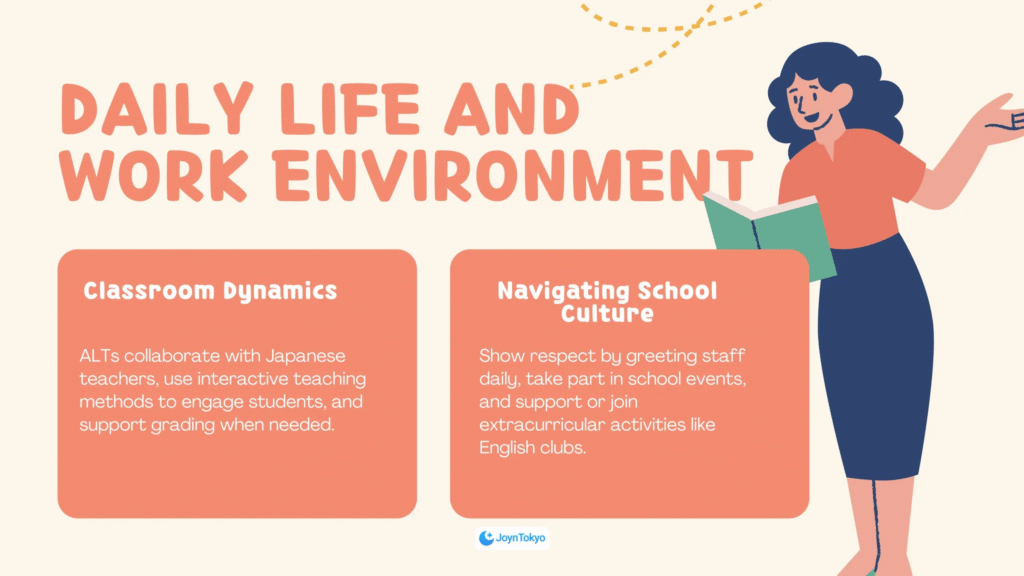If you are a foreign resident — or planning to move to Japan — working as an Assistant Language Teacher (ALT) can be a rewarding way to immerse yourself in Japanese culture. Not only can you support students in improving their English communication skills, but you also get to experience day-to-day life in a local community. Below is a comprehensive guide on what to expect, how to apply, and how to thrive as an ALT in Japan.
Read More
Understanding the ALT Role
ALT positions in Japan involve supporting Japanese teachers of English in public or private schools. While your primary focus is helping students build confidence in English, the role often extends beyond the classroom.
Key Responsibilities

The first thing to note is that, even as an assistant teacher, you will be tasked with a fair amount of work both in and out of the classroom. You will often be planning lessons, which, depending on the level or grade you are teaching, can include creating teaching materials, including props, as well as grading homework.
Additionally, as an ALT from abroad, students will be curious about you, and the place you come from. As such, it is always a good idea to make points of comparison with your homeland: “In Japan, this is the done thing, but in Australia, we do things differently,” and so on.
One of the most important part of learning English is, of course, being able to speak it. This means that you will be expected to take part in, and often lead, role playing, language games, and group discussions. All of this will be planned in advance, though naturally the ability to improvise is vital.
Finally, you’ll be expected to give feedback on the written and spoken work, and may even be asked to help judge a speaking competition, or help out in a play.
Where ALTs Work

There are a few places that will hire ALTs in Japan. Public elementary, junior high, and high schools will often hire ALTs for a number of years, which can guarantee job security. The curriculum is also set, so there is less work needed for preparation and forging new curricula. At the same time, this means less creativity, and the pay can be lower than in private schools, depending on the location.
Private schools tend to pay higher wages, but again this will vary from school to school. You are also expected to be more proactive in creating lessons, and to be more capable of handling things when they don’t go according to plans. This does allow for more creativity, but you are also more directly responsible for your actions, which can be difficult for anyone starting out.
There are also government-sponsored programs, such as the JET program, which will assign you a school, as well as housing, and can be especially helpful for someone looking to move to Japan for the first time. The JET program typically places ALTs in public schools, though at the request of the local government, it is possible that they will be assigned to private schools. JET ALTs typically work in areas outside of major cities like Tokyo.
You may also wish to be assigned to a dispatch company, where you can be assigned a school to teach at when a teacher is needed. This can be somewhat exciting, as you may get the chance to go to new schools. However, if the work is to cover for a missing teacher — for example, maternity cover — then the work may be more temporary.
Qualifications To Become an Assistant Language Teacher in Japan

Knowing the basic requirements for becoming an ALT in Japan can help streamline your application process. Some schools, especially public schools, have longer hiring periods that can take a few weeks, though this can be shorter during peak hiring periods, typically around April and September. Private schools often have shorter hiring processes, but you will still likely be asked to complete a trial lesson as a minimum to prove your suitability.
Work Visa
This is one area where there can be some confusion: private schools are capable of hiring people with an Instructor Visa, an Engineering/Specialist in Humanities/International Studies (E/S/I) Visa, or even a Working Holiday Visa. However, public schools will require an Instructor Visa, and very rarely will accept other kinds.
An Instructor Visa as benefits and downsides: after being approved for the visa, which will require a degree and/or a teaching qualification, as well as being able to demonstrate that you have over 12 years of education in the language you want to teach, then you may find that you have an easier time finding teaching positions, as it is often assumed that you have the necessary skills to teach.
However, Instructor Visas are less flexible that E/S/I Visas, as teaching is the only form of work allowed: other types of employment are forbidden.
An E/S/I Visa, conversely, means that you can teach in private schools, but very rarely in public schools. The flexibility means that, in addition to teaching, you can do work on the side in a different field. Conversely, you may find it more difficult to find a full time teaching position than those with an Instructor Visa.
Click here for more on the differences in Visas, and their requirements.
Language Skills and Cultural Knowledge
In order to teach English, it is expected that the ALT applicant speaks English at a native level, or if it is a second language, fluently. Conversely, Japanese language ability is rarely a prerequisite, though having some basic knowledge can be beneficial for getting on with staff and students, who will likely only speak some elementary English.
Additionally, because you will likely be taking part in culture festivals, sports festivals, and observing Japanese traditions at multiple points as a teacher, so being open to exploring and celebrating Japanese culture is a huge plus.
Boost Your Chances of Finding the Right Opportunity!
Speak to our consultants to find out how you can start working in Japan!
Book Your FREE Consultation✓ 500+ Bookings as of 2026-02-06 ✓ English-speaking support
How to Become an ALT

There are various pathways to land an ALT job in Japan. Each option has unique application timelines and procedures.
JET Program (Japan Exchange and Teaching)
A government-sponsored initiative that places ALTs in public schools across Japan. This is often considered the gold-standard for ALTs coming to Japan for the first time, as the program is extremely helpful in arranging things like accommodation and generally getting set-up in Japan, as well as being relatively well paid. However, for anyone who wants to live in a big city, this may not be the right choice, as most of the positions are in more rural areas.
Private Dispatch Companies
These are companies that recruit foreign teachers and assign them to specific schools. These are especially popular in areas like Tokyo, that have a lot of schools and students, and so often need teachers. This means a rolling-recruitment basis that makes it easier to find work, though it might not always be long term. They’re also open to those with E/S/I Visas.
Direct Hire
Some schools will hire people directly, often for full time employment. However, these are relatively rare. Aside from finding the school advertising a position on an employment website, one of the best ways to find such a position is to get to know another teacher or owner of a school, who can let you know when positions come up.
Official Resources:
- Immigration Services Agency of Japan: https://www.isa.go.jp/en/
- JET Program: https://jetprogram.mofa.go.jp/
- Ministry of Education (MEXT): https://www.mext.go.jp/en/
Daily Life and Work Environment

Beyond the classroom, adapting to the Japanese work environment and local customs is crucial for success. Although you will be spending the majority of your day with children, you need to remember that as well as being an ambassador for your home country, you are a role model as an adult to children. So here are some tips to make your time in the work environment run smoothly.
Classroom Dynamics
Firstly, you should remember to work closely with your Japanese colleagues. While you may be an assistant teacher, you will be expected to contribute both positively and professionally. Don’t be afraid to ask questions, but remember that they cannot handle everything for you, as they are also busy.
This will include, of course, reviewing and grading work. As the native or fluent part of the equation, it is expected that you will have an expert knowledge of the language, and so you will often be responsible for grading.
In the classroom, as mentioned, you will be expected to participate in role play and group discussions. You are expected to do so with enthusiasm, to make students more interested, and stoke enthusiasm in them.
Navigating School Culture
The culture of Japanese schools is not dissimilar to that of many Japanese workplaces. You should make sure to greet your colleagues each morning, and as mentioned, you will be expected to join in with school cultural festivals and other activities.
You should also consider joining extracurricular clubs. These can be directly related to your role as a teacher, such as an English conversation group, or it can be something related to an outside interest, such as soccer. Enthusiastically helping out with extracurriculars will go a long way to ingratiating yourself with students and staff.
Average Salaries of an Assistant Language Teacher in Japan
| Hiring Organization | Starting Monthly Salary | Potential Salary Raise |
|---|---|---|
| JET Programme | ¥280,000 | ¥330,000 |
| Direct Hire | ¥250,000 | ¥300,000 |
| Dispatch Companies | ¥230,000 | ¥280,000 |
While salaries will differ from place to place, and from school to school, there are some general salary expectations that you can have in mind when you are applying for positions. Please keep in mind that these are salaries for full time positions.
The JET program’s first year salary is ¥280,000 per month. This seems similar to other ALT salaries, but in addition to the help settling in Japan mentioned above, the program also pays for airfare, registers ALTs in national insurance, and provides free Japanese language learning resources.
Direct hires average a salary of around ¥250,000 per month. This is lower than the JET program’s salary, but as a direct hire, you have more control in where you work, and can potentially negotiate for more, rather than being set into JET’s standard salary.
Dispatch companies typically pay the least, at ¥230,000 per month. They are easier jobs to find, but this also comes with the caveat that, during holidays, you are unlikely to receive pay, and may need to make alternative arrangements.
Tips for Success as an ALT

Thriving as an ALT requires a blend of teaching finesse and cultural adaptability. Small daily actions can strengthen your relationships with students and co-teachers, and improve prospects for your future career.
Professional Development
Its a good idea to join workshops or online seminars to improve your teaching techniques. Even if you have a TEFL or similar qualification, there are some things that you won’t expect or anticipate until you start teaching for real, so it’s great to get extra tips from experienced teachers.
Along these lines, its also a good idea to network with fellow ALTs. This is also a great way to get advice, but is also good for morale, forming a community, and they may be able to help you with direct hiring opportunities in the future.
You should also seek out feedback from your Japanese colleagues. They will likely have insights into the job and areas to improve on that your fellow ALTs may not know.
Cultural Adaptation
Along these lines, it is a good idea to learn at least a little Japanese. This will help you in the classroom, and also open doors for you in your life outside of school. Another great idea is to join in with local community events, like festivals, to become part of your hometown, and enrich your experience living in Japan.
Becoming an ALT in Japan is an excellent way to merge professional development with cultural immersion. By meeting the educational requirements, refining your language skills, and understanding Japanese customs, you can create a positive impact on students’ lives while enjoying a deeply rewarding career. With proper preparation and an open mind, working as an ALT can broaden your horizons and help you form lasting connections in Japan.










